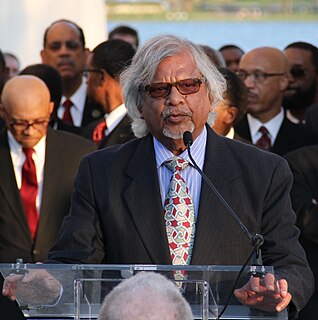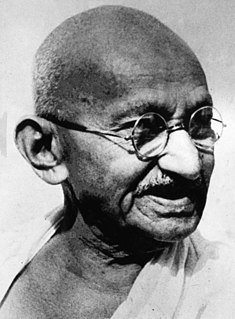Related Research Articles

Bertrand Arthur William Russell, 3rd Earl Russell, was a British philosopher, logician, mathematician, historian, writer, essayist, social critic, political activist, and Nobel laureate. At various points in his life, Russell considered himself a liberal, a socialist and a pacifist, although he also confessed that his sceptical nature had led him to feel that he had "never been any of these things, in any profound sense." Russell was born in Monmouthshire into one of the most prominent aristocratic families in the United Kingdom.

Frederick Charles CoplestonSJ was a Jesuit priest, philosopher, and historian of philosophy, best known for his influential multi-volume A History of Philosophy (1946–75).

Mohandas Karamchand Gandhi was an Indian lawyer, anti-colonial nationalist, and political ethicist, who employed nonviolent resistance to lead the successful campaign for India's independence from British Rule, and in turn inspire movements for civil rights and freedom across the world. The honorific Mahātmā, first applied to him in 1914 in South Africa, is now used throughout the world.
Events in the year 1948 in India.
Events in the year 1931 in India.

Kasturbai "Kasturba" Mohandas Gandhi (
Events in the year 1944 in India.
Events in the year 1930 in India.
Events in the year 1869 in India.

A History of Philosophy is a history of Western philosophy written by the English Jesuit priest Frederick Charles Copleston originally published in nine volumes between 1946 and 1975. As is noted by The Encyclopedia Britannica, the work became a "standard introductory philosophy text for thousands of university students, particularly in its U.S. paperback edition." Since 2003 it has been marketed as an eleven volume work with two previously published other works by Copleston being added to the series.

Copleston High School is a secondary school for ages 11–18 in Ipswich, England. It is an academy, and caters for around 1,800 students, as well as between 340-370 students in the sixth form which was shared with Holywells High School until 2011. A 2009 Ofsted inspection rated its overall performance as good with outstanding features.
In India, there are five days declared as Martyrs' Day. They are named in honour of those who are recognised as martyrs for the nation.
Dinanath Gopal Tendulkar (1909–1972) was an Indian writer and documentary film maker. He is most well known as the author of an eight-volume biography of Mahatma Gandhi, titled Mahatma: Life of Mohandas Karamchand Gandhi. He was also a close associate of Vithalbhai Jhaveri and collaborated for the documentary film, Mahatma: Life of Gandhi, 1869–1948.He died on Monday, June 12 1972.

Arun Manilal Gandhi is an Indian-American socio-political activist, and the fifth grandson of Mohandas Gandhi through his second son Manilal. Although he has followed in the footsteps of his grandfather as an activist, he has eschewed the ascetic lifestyle of his grandfather. In 2017 he published The Gift of Anger: And Other Lessons From My Grandfather Mahatma Gandhi.
Vithalbhai Jhaveri (1916–1985) was an Indian independence activist, filmmaker, photographer, writer and a close associate of Mahatma Gandhi. He documented Gandhi, since the Dandi March till his death in 1948, through numerous photographs which were displayed at many exhibitions and used in several literary works. Gandhi-A Photo Biography, a book by Peter Rühe, uses several of his photographs and he was a collaborator of Dinanath Gopal Tendulkar, in the latter's biography of Mahatma Gandhi, Mahatma; Life of Mohandas Karamchand Gandhi. His 330-minute documentary on Gandhi, Mahatma: Life of Gandhi, 1869–1948, covers the Indian leader's life through 14 chapters. The Government of India awarded him the third highest civilian honour of the Padma Bhushan, in 1969, for his contributions to Literature and education.
Herbert Fischer (1914–2006) was a German diplomat, indologist and the ambassador of the erstwhile German Democratic Republic to India from 1972 to 1976. Born on 10 April 1914 in Herrnhut, in East Germany to a craftsman, he migrated to western Europe in 1933 where he did his schooling and moved to India in 1936 which gave him the opportunity to get acquainted with Gandhiji. After the Indian independence in 1947, he went back to the German Democratic Republic and joined the Ministry of Foreign Affairs in 1956. He served as the Chief of East German Trade Mission in the late 1960s before becoming the East German ambassador to India in 1972. He was the author of many Indological books which included Mohandas Karamchand Gandhi, a biography of the Indian leader. He was a recipient of the Patriotic Order of Merit III Class. The Government of India awarded him the third highest civilian honour of the Padma Bhushan, in 2003, for his contributions to public affairs.

The Gandhi family is the family of Mohandas Gandhi. Gandhi was the distinguished leader of the Indian independence movement in British-ruled India. Mahatma : is also called the Father of the Nation or "Bapu" as the prime minister called him at his funeral; a title given to him by Subhas Chandra Bose on 6 July 1944 during his address on the Singapore Radio. On 28 April 1947, Sarojini Naidu too referred Gandhi with the title Father of the Nation. Gandhi is also referred to as Bapu (Gujarati: endearment for "father", in India. In common parlance in India he is often called Gandhi ji. An anonymous journalist from Jetpur town in Saurashtra he has also been referd to as Gae-ndy or Ga-ndhi as in the a makes an "ah" sound, in an anonymous letter referred Mohandas Karamchand Gandhi as Mahatma, for the first time while he was still in South Africa. Gandhi's family consists of him, his wife and his five sons.
The Copleston–Russell debate is an exchange concerning the existence of God between Frederick Copleston and Bertrand Russell in a 1948 BBC radio broadcast. The debate centers on two points: the metaphysical and moral arguments for the existence of God. According to Graham Oppy and Nick Trakakis, the arguments used in this debate would typify the arguments presented by theists and atheists in the latter half of the 20th century, with Russell's approach often being used by atheists in the late 20th century.
References
- ↑ "1940s" (PDF). The BBC Story. BBC. Archived from the original (PDF) on 2011-12-18. Retrieved 2010-06-26.
- ↑ "Mohandas K. Gandhi: The Indian Leader at Home and Abroad". The New York Times. 31 January 1948. Retrieved 23 January 2013.